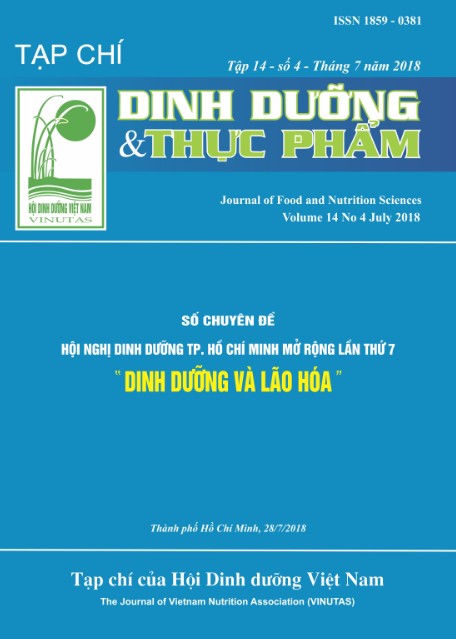NUTRITION FOR AGING PEOPLE
Main Article Content
Abstract
Nutrition has an important role in health of the elderly. The prevalence of malnutrition
is increasing in this population and is associated with a decline in functional status, impaired muscle function, decreased bone mass, immune dysfunction, changes in cytokine
and hormonal level, and changes in fluid electrolyte regulation, delayed gastric emptying
and diminished senses of smell and taste, anemia, and reduced cognitive function. In addition, pathologic changes of aging such as non-communicable diseases and psychological
illness all play a role in the complex etiology of malnutrition in aging people. Nutritional
assessment is important to identify and treat patients at risk.
Good nutrition care helps reduce malnutrition, maintains muscle mass and bone mass
to reduce disability, fractures, risk of non-communicable diseases, to slow the aging
process, and to prolong the life span. Many diseases in the elderly are the result of unhealthy diet combined with physiological changes in the aging process. The most common
nutrition-related diseases in the elderly are malnutrition, obesity, dyslipidemia, hypertension, diabetes mellitus, strokes, cancers and non-communicable diseases.
Requirement for energy, lipid, and carbohydrates decreases, while the need for protein
and most vitamins, minerals, fiber and water increases in the elderly. Keeping a good balance of nutrients derived from animals and plants, maintaining dietary moderation and
choosing alternative foods should be prioritized when designing the diet for the elderly.
Patients with physical or cognitive impairment require special care and attention. Oral
supplements or enteral feeding should be considered in patients at high risk or in patients
unable to meet daily requirements.
Keywords
The elderly, nutrition requirement, nutrition recommendation
Article Details
Similar Articles
- Đỗ Thị Thanh Huyền, Nguyễn Mạnh Đạt, Bùi Thị Hồng Phương, Đỗ Thị Thủy Lê, Lê Đức Mạnh, RESEARCH ON OPTIMAL CONDITIONS FOR THE CONVERSION AND SYNTHESIS OF TREHALOSE FROM CASAVA STARCH BY ENZYMEATIC METHOD , Vietnam Journal of Nutrition & Food: Vol. 15 No. 5+6 (2019)
You may also start an advanced similarity search for this article.


